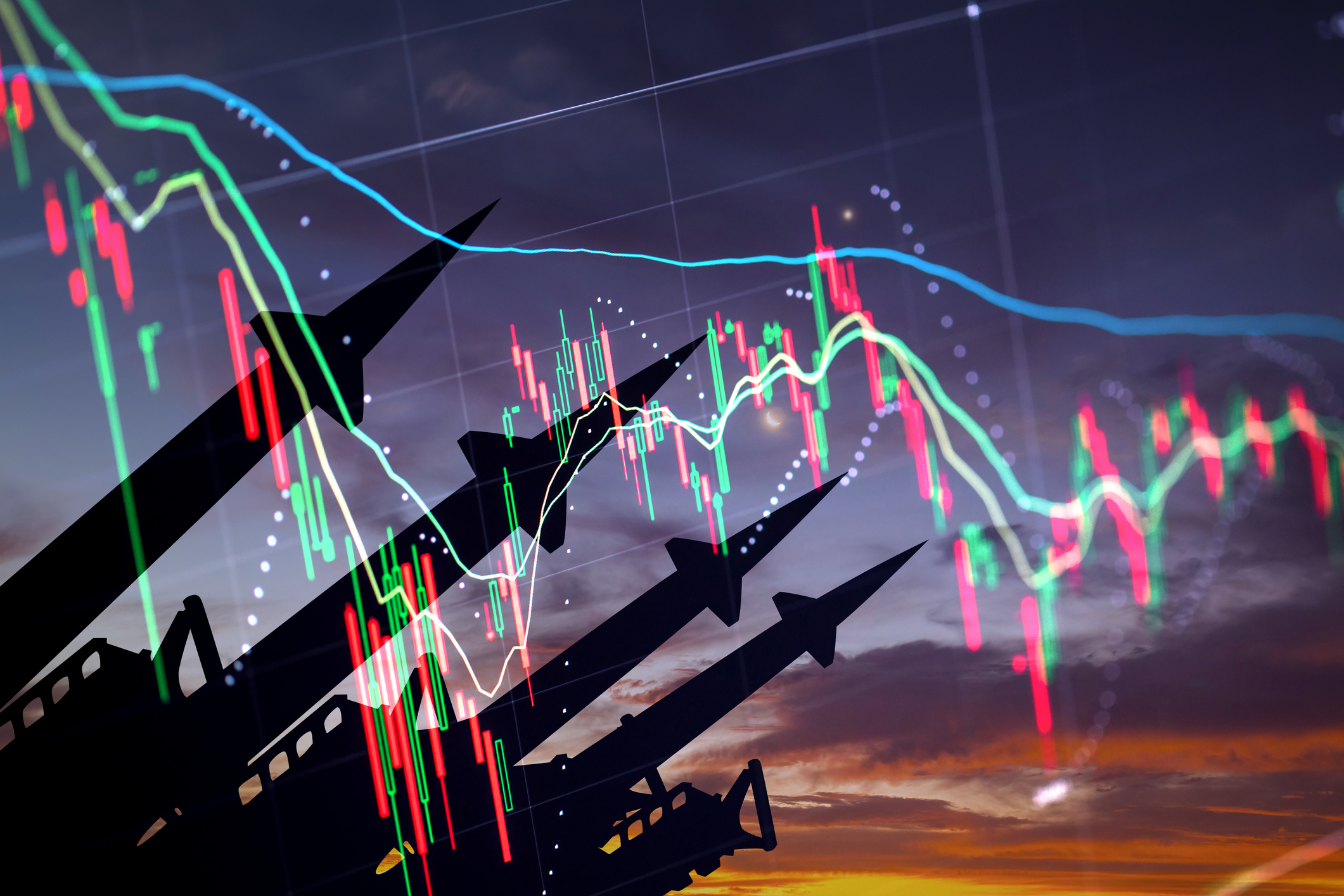Three defence stocks set to flourish in an era of instability
A professional investor tells MoneyWeek where he’d put his money. Tom Bailey highlights three defence stocks that look promising.


Get the latest financial news, insights and expert analysis from our award-winning MoneyWeek team, to help you understand what really matters when it comes to your finances.
You are now subscribed
Your newsletter sign-up was successful
Want to add more newsletters?

Twice daily
MoneyWeek
Get the latest financial news, insights and expert analysis from our award-winning MoneyWeek team, to help you understand what really matters when it comes to your finances.

Four times a week
Look After My Bills
Sign up to our free money-saving newsletter, filled with the latest news and expert advice to help you find the best tips and deals for managing your bills. Start saving today!
Each week, a professional investor tells MoneyWeek where he’d put his money. Tom Bailey, the head of ETF research at HANetf, highlights three defence stocks that look promising.
The world has entered a new period of geopolitical instability. There is a growing list of either active or potential conflicts: Russian aggression in Europe, China and Taiwan, the US and Iran and Israel’s current war with Hamas.
Across the globe, countries are rearming for this more perilous world. In particular, European NATO members are ramping up military spending, reversing the post-Cold War decline in defence budgets.
MoneyWeek
Subscribe to MoneyWeek today and get your first six magazine issues absolutely FREE

Sign up to Money Morning
Don't miss the latest investment and personal finances news, market analysis, plus money-saving tips with our free twice-daily newsletter
Don't miss the latest investment and personal finances news, market analysis, plus money-saving tips with our free twice-daily newsletter
1. HANetf’s Future of Defence UCITS ETF
HANetf’s Future of Defence UCITS ETF (LSE: NATO) provides exposure to the companies generating revenue from defence and cyber-defence spending by NATO and its allies.
One example of the NATO ETF’s holdings is BAE Systems (LSE: BA), the largest British defence manufacturer and supplier. This company has played a crucial role in supplying weapons to Ukraine, with a record order intake of £37.1bn in 2022. BAE Systems has also entered agreements with the Ukrainian government to establish a local presence and increase support for Ukraine’s armed forces.
The company is also a key participant in Aukus, a security partnership between Australia, the UK, and the US aimed at countering China’s ambitions in the Indo-Pacific. In October, it received a £3.95bn contract from the UK Ministry of Defence to build a new generation of attack submarines as part of Aukus.
2. Leonardo
Then there is Leonardo (Milan: LDO), an Italian company specialising in aerospace, defence and security. It stands to benefit from European Nato countries’ commitments to increase military spending in line with the Nato target of 2% of GDP.
Given Italy’s preference for domestic products, Leonardo is well-positioned to gain from the government’s increased spending. But Leonardo is a global company, with contracts across Europe, including the UK. At the same time, it has exposure to the growing demand seen by German defence firms, thanks to its 25% stake in German company HENSOLDT. This will also allow Leonardo to benefit from the growing demand for German-manufactured weapons. Germany, after all, is the industrial heartland of Europe, with its manufacturing base playing a key role in the revival of European NATO defence capabilities.
3. Palantir Technologies
Palantir Technologies (NYSE: PLTR) builds digital infrastructure and artificial intelligence (AI) to help clients manage data related to security or financial threats.
It counts among its customers IBM, Amazon, and Airbus. But its technology also has a military application, increasingly demonstrated on the battlefield in Ukraine. In modern warfare, binoculars or physical maps are becoming less important. Instead, armies are using sensors, satellites, and fleets of drones to map out the battlefield.
The reams of data collected need to be filtered to provide intelligence serving as a basis for action. Palantir uses satellites and social media to visualise enemy positions and then employs its algorithms to sift through this data, allowing an army to decide as quickly as possible where to deploy resources.
Ukraine’s military has been a big user of Palantir. The company’s CEO, Alex Karp, was the first global business leader to meet Ukrainian president Volodymyr Zelensky following the February 2022 invasion.
This article was first published in MoneyWeek's magazine. Enjoy exclusive early access to news, opinion and analysis from our team of financial experts with a MoneyWeek subscription.
Related articles
- 5 defence stocks to arm your portfolio
- Invest in defence stocks as war goes hi-tech
- Why the West must invest in defence - and you should too
- What are exchange traded funds (ETFs)?
Get the latest financial news, insights and expert analysis from our award-winning MoneyWeek team, to help you understand what really matters when it comes to your finances.
Tom Bailey is Head of Research at HANetf, which entails him staying on top of the various themes and asset classes accessible by ETFs or ETCs on the HANetf platform. He is regularly cited in the press, including the Financial Times, Reuters and The Times. Tom was previously ETF specialist at interactive investor. Prior to this, he was a financial journalist and edited the book Money Observer: Your Guide to Investment Trusts.
-
 Should you buy an active ETF?
Should you buy an active ETF?ETFs are often mischaracterised as passive products, but they can be a convenient way to add active management to your portfolio
-
 Power up your pension before 5 April – easy ways to save before the tax year end
Power up your pension before 5 April – easy ways to save before the tax year endWith the end of the tax year looming, pension savers currently have a window to review and maximise what’s going into their retirement funds – we look at how
-
 Three key winners from the AI boom and beyond
Three key winners from the AI boom and beyondJames Harries of the Trojan Global Income Fund picks three promising stocks that transcend the hype of the AI boom
-
 RTX Corporation is a strong player in a growth market
RTX Corporation is a strong player in a growth marketRTX Corporation’s order backlog means investors can look forward to years of rising profits
-
 Profit from MSCI – the backbone of finance
Profit from MSCI – the backbone of financeAs an index provider, MSCI is a key part of the global financial system. Its shares look cheap
-
 'AI is the real deal – it will change our world in more ways than we can imagine'
'AI is the real deal – it will change our world in more ways than we can imagine'Interview Rob Arnott of Research Affiliates talks to Andrew Van Sickle about the AI bubble, the impact of tariffs on inflation and the outlook for gold and China
-
 Should investors join the rush for venture-capital trusts?
Should investors join the rush for venture-capital trusts?Opinion Investors hoping to buy into venture-capital trusts before the end of the tax year may need to move quickly, says David Prosser
-
 Food and drinks giants seek an image makeover – here's what they're doing
Food and drinks giants seek an image makeover – here's what they're doingThe global food and drink industry is having to change pace to retain its famous appeal for defensive investors. Who will be the winners?
-
 Barings Emerging Europe trust bounces back from Russia woes
Barings Emerging Europe trust bounces back from Russia woesBarings Emerging Europe trust has added the Middle East and Africa to its mandate, delivering a strong recovery, says Max King
-
 How a dovish Federal Reserve could affect you
How a dovish Federal Reserve could affect youTrump’s pick for the US Federal Reserve is not so much of a yes-man as his rival, but interest rates will still come down quickly, says Cris Sholto Heaton
